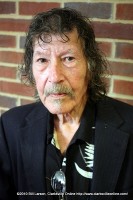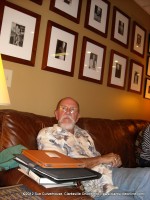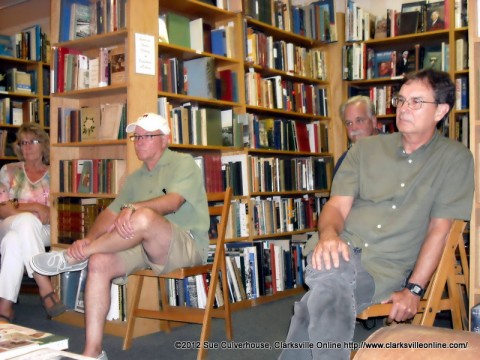
A Remembrance and Celebration of the Life of William Gay at Landmark Booksellers in Franklin on Friday, June 29, was one of the most memorable evenings of my life.
Special guests included Sonny Brewer, founder of Over the Transom Bookstore in Fairhope, Alabama, as well as the annual literary conference, Southern Writers Reading, and the Fairhope Center for Writing Arts, was a close friend of William. Chris Gay, one of William’s two sons, is a songwriter, singer and guitarist. Both shared their memories of William to an eager audience of listeners.
The memorial service was held at Landmark Booksellers, 114 East Main Street in Franklin, TN just off the town square. The store is a reader’s paradise with floor-to-ceiling bookcases filled with literary gems, both rare and new, tempting the reader to load a car or truck or trailer with books of every variety. The store’s walls feature black-and-white pictures of famous Southern authors, especially those from Tennessee. Owners Joel and Carol Tomlin are warm, inviting and extremely knowledgeable about both the books they sell and the many authors represented there. They too were close friends of William Gay who had five readings at Landmark Booksellers over the years with Sonny Brewer attending four of them.
Sonny, an accomplished author himself, has written Rembrandt the Rocker, The Poet of Tolstoy Park, The Widow and the Tree, A Sound Like Thunder,, Stories from the Blue Moon Cafe: Anthology of Southern Writers (four editions), Cormac: A Tale of a Dog Gone Missing, Yin for Change: Awakening Imagination for More Life in Your Living, Red Bluff Review, A Cast of Characters, and Don’t Quit Your Day Job: Acclaimed Authors and the Day Jobs They Quit. He also was the ghost writer for a biography of Clarence Darrow.
His web site proclaims Brewer is the former editor-in-chief of Mobile, Alabama’s city magazine, Mobile Bay Monthly; he also published and edited The Eastern Shore Quarterly and edited Red Bluff Review. His training as a writer began with his first real job at 15, where he flipped burgers as a short-order cook at Woody’s Drive-In in Millport, Alabama. His story-telling education continued as service station attendant, pants folder, folk singer, used car salesman, sailor and electronics technician in the U.S. Navy, tugboat deckhand, traveling used tire salesman, carpenter, building contractor, real estate salesman, purveyor of collectible automobiles, magazine editor, newspaper columnist, teacher, lecturer, coffeehouse manager, bookseller, publisher, and, lately, novelist.
 Needless to say, when William Gay and Sonny Brewer sat down together, they had a lot to talk about.
Needless to say, when William Gay and Sonny Brewer sat down together, they had a lot to talk about.
Joel Tomlin introduced Sonny and Chris by talking about the first time he saw William Gay—precisely at a book-signing at Davis-Kidd (bookstore) in Nashville. He said every foot of the building, including going up the stairs was crammed with people wanting William to sign Provinces of Night. When William entered the room, Joel remembers, he looked as if he couldn’t believe all those people had come to see him.
“The last time I saw William was when a friend of mine who is a Marine, formerly a student of literature at Ole Miss and Sewanee, had just come back from Africa. The friend asked if I would take him to see William. I called to see if we could take some barbecue from Puckett’s and spend a little time with William. He said we could—and we spent four of the most enjoyable hours talking about movies, books and music,” Joel said. “It was near the end of January (before William died in February, 2012) and it was a great time of sharing. I am so grateful for that time.”
Sonny thanked Joel for having Chris and him saying, “We’ll do anything for money—and not always a lot of it!”
William rode with Sonny to Maine to speak at a library there. The librarian said that more people came to see William than any other author they had ever invited—including John Irving and Robert Frost!
Sonny met William in a used and rare bookstore in South Carolina because of Tommy Franklin. “Tommy knew I like to speculate on books that might be considered rare in the future so he told me a guy was going to be signing some chapbooks that Sunday morning. He said the man was William Gay. I told him I’d never heard of him, but Tommy said, ‘You shall!’ That night I went into the bar and Tommy pointed out that William was sitting alone in a booth. I went over and introduced myself. We started talking about a Maxwell Perkins biography that I was reading for the first time and William was reading for the second—and then we talked about Hemingway and Thomas Wolfe and others.
“The next morning I started to check out but was going by to get a chapbook. The line was all the way out the door and down the hall. I wouldn’t stand in a line that long to see the Dallas cheerleaders so I started to leave. Tommy came up to me and said he knew I wouldn’t stand in that line so he had a chapbook for me.” (At that point, Sonny produced that same chapbook to show the crowd.”
Sonny continued, “I was riding with an author that I was taking around to various places and Kyle, our driver, who proceeded to take off about 90 miles an hour. I was in the back seat wondering if I would survive the trip when I decided to ask if they wouldn’t like me to read to them, hopefully to get the car back to a reasonable speed. I opened William’s chapbook and began to read in a loud voice. Kyle slowed down. We were all completely captivated by this story. Kyle slowed down to 45 miles an hour. When I finished reading, no one spoke for a while minute. Finally someone said, ‘Damn!’
Sonny learned that if William were going anywhere with him, Sonny would be driving. “William didn’t like to cross bridges or merge, so that pretty much keeps you at home.!”
William never took a college class nor had an M.F.A., Sonny reminded the crowd. His work was filled with intense writing that defies description with phrases like “such drunks as were seen about struggled up,” “moved in altered time,” “scorched spiders,” and “glades permeated with silence.” Sonny questioned William about how much time it took him to write a couple of paragraphs in The Long Home that were mesmerizing in their brilliance.
When William replied that it took “however long it took me to set them down,” Sonny could hardly believe him because he knows people who work on some phrases for weeks at a time.
William explained, “When I’m hanging drywall, I’m not really there. It’s a wonder I still have my hands. I’m writing that sentence in my head again and again. When it gets quiet and the kids are in bed, I just put it down.”
William Gay didn’t write in sequence. He might write 13 paragraphs for a book and then the next section on the paper might be for a short story. Once his house was broken into and an entire novel about the Natchez Trace was stolen. When Sonny asked William if that novel would turn up some day under someone else’s name, William said, “That’s impossible. I only wrote the pieces. Nobody could put it together but me because there was no synopsis.”
Fortunately, The Long Country, William’s last book that was completed but not yet published has a synopsis that Sonny hopes to use to get the book ready for publication.
When asked if he had a photographic memory, William said that he didn’t, yet when he would talk on the phone with Cormac McCarthy, both of them would quote long passages from their favorite books.
Sonny and William took many long trips together to different areas of the country where they would speak about their books. Once William said that Robert Penn Warren’s “Blackberry Winter” was the perfect story because you couldn’t take out a word or add a word to make it any better. He added that it, along with “A Good Man Is Hard to Find” by Flannery O’Connor, was one of the five perfect stories ever written.
On another trip to Fort Lauderdale, Sonny was given only four minutes to speak by the moderator (who, Sonny reported, didn’t like him), so he just read a passage. Then a woman in the audience took 15 minutes to frame a question for William. William answered, “Sometimes.” Sonny said, “The man just didn’t buy into horseshit.”
 Another time on St. Simon’s Island, William was with Sonny and a female writer on a panel. A publicist arrived and told William, “The limousine is here.” When he insisted that the other two go in the limo, she said, “This is big stuff. It’s just for you.” William sat back down and said, “I won’t be going.” And he didn’t.
Another time on St. Simon’s Island, William was with Sonny and a female writer on a panel. A publicist arrived and told William, “The limousine is here.” When he insisted that the other two go in the limo, she said, “This is big stuff. It’s just for you.” William sat back down and said, “I won’t be going.” And he didn’t.
Sonny once had a writer who had sold 350,000 copies of his latest book but couldn’t get anything else published. He sent Sonny a story that Sonny liked and was ready to publish in the Blue Moon Cafe series. At the last minute, the author called to pull the story because it was going to published in Southern Review. Sonny said, “I called Tommy Franklin to complain about the man’s behavior. Tommy told me to button it because I would have done that too. We agreed that there was only one man we knew who would never have made that phone call to pull his story and we yelled out together ‘William Gay!’”
The integrity of the man was impeccable, Sonny assured everyone. If William were asked to write a review of a book, he would never write a bad review for anyone, merely replying if he didn’t like the book, “I don’t want to review this book.” He wouldn’t lie and was not deceitful. He wouldn’t say anything if it were hurtful, Sonny said.
“He listened to the way people speak, to the rhythm and cadence of language,” Sonny insisted. “He got dialogue right when he wrote.”
Once he heard a story that Melinda Haynes told about a school teacher whose divorced husband, the maintenance man in the school, made a place over her room where he could sleep and eat. He made a tiny village even of the street where they had lived. He also bored a hole in the ceiling over her room so that he could watch her. William said, “Can I use that?” She said he could—and years later, she called William to see if he had. When he replied, “Yes,” she hung up!
Interspersed between memories of William by Sonny were songs that Chris Gay played on his guitar and sang. William loved Bob Dylan so Chris ended with one of his favorites, “Don’t Think Twice.” Chris said that his father claimed that Bob Dylan’s music brought him home to Hohenwald.
“Dad and I had a great relationship and I lived at home for a long time before I got married a couple of years ago,” Chris remembered. “Dad told me before I left that we’d had a good run. That made me feel sad because I felt like he thought I’d be gone forever.”
Chris’s childhood was filled with the voice of his father reading to all the kids (two boys, two girls) in the family. “Dad believed that through books you could learn anything and I think he was right. We never needed a dictionary or set of encyclopedias when we were growing up. We just asked Dad. I thought all fathers were like that.”
William claimed that he’d have liked to be a musician, but after giving Chris a guitar, he played better in a few hours than William did. Chris said, “Don’t let that fool you. He played well enough to teach me and to play some pretty difficult music.
“I grew up feeling like I was related to Arlo Guthrie so when I got a guitar for my birthday one year, I spent all night learning ‘Alice’s Restaurant.’ Every time I’d learn a new note of the song, I’d wake Dad up and play it for him. He said he was pretty tired hanging drywall the next day.”
A member of the audience asked Chris if William had other novels from the days before he became famous that were not published. Chris replied that his dad probably threw away 15 or 16, but they probably weren’t that good. Chris said that his father was in his fifties when he finally got “down to it.”
Sonny said that William believed that writers have to live to become a writer.
Sonny emphasized that in Chris, we have the continuation of William’s legacy and that his songwriting was a direct influence of William. “He has been well sired,” Sonny proclaimed.
Chris replied, “Me and my daddy understood each other real good. He was one hell of a man.”
“Stephen King said that William Gay is probably one of the most important literary figures in America today,” Joel Tomlin reminded us all.
Sonny concluded, “It has not stopped. William’s work will continue.”



